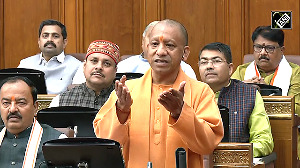The issues relating to the reference to K Natwar Singh, the Congress and a number of Indian industrial houses in the final report of the supposed Independent Inquiry Committee of the UN headed by Paul Volcker, former chairman of the US Federal Reserve, need to be debated in the over-all national interest.
One should resist the temptation to exploit it for partisan political purposes.
Natwar Singh stripped of portfolio I The Volcker Report: Full coverage
The Volcker report refers to individuals and entities in a number of countries. In other countries, one does not see the kind of excitement, name-calling and brickbat that one has been seeing in India. Why?
The credibility of the US as a world power, of the Bush administration and American professional experts, governmental or non-governmental, has taken a severe beating following the manner in which the US, supported by its experts, made out a false case against the Saddam Hussein government in order to justify its invasion and occupation of Iraq.
The anti-Saddam campaign whipped up by the Bush administration was based on four claims.
First, Iraq was clandestinely acquiring weapons of mass destruction.
Second, it was in league with the Al Qaeda.
Third, it had carried out large-scale massacres of the Shias.
And four, it had misused the UN's Oil-For-Food-Programme.
Of the four, the first three have already been proved to be blatant lies deliberately disseminated by the disinformation divisions of the US intelligence agencies. There is, therefore, a compulsive urge in the US official circles to show that at least the fourth allegation was correct.
All US administrations -- particularly the Republicans more than the Democrats -- have never hesitated to use lies and fabrications to settle political score against not only foreign, but also even domestic adversaries.
The post-Watergate inquiries brought out how the Federal Bureau of Investigation planted false stories and fabricated documents in an unsuccessful attempt to destroy the reputation of the late Reverend Martin Luther King and to what depths Richard Nixon did not hesitate to descend in his campaign against the Democrats.
In the past, India in general and Indira Gandhi in particular were the victims of the worst kind of disinformation disseminated by the CIA in order to teach them a lesson. How many of us remember the stories, reports and documents circulated by the CIA, alleging that she had given a naval base to the USSR in Vizag and the Andaman and Nicobar Islands?
Congress' idiotic threat to the UN!
Or that she had ordered the entry of the army into the Golden Temple in Amritsar in 1984 on the advice of the KGB, the Soviet intelligence agency, and that KGB advisers served in the staff of the then Lieutenant General K Sunderji, who was in charge of the operation.
More recently, we had seen the ruthless manner in which US Vice-President Dick Cheney tried to teach a lesson to the husband of a CIA expert who wrote in a newspaper that the evidence placed by the US before the UN Security Council on the alleged procurement of natural uranium by Saddam from Niger was fabricated.
The vice-president, through his chief staff officer, allegedly leaked out to the media that his wife was an undercover CIA officer, thereby damaging her career as an intelligence professional.
The US administration has sufficient grounds for disliking Natwar Singh -- his past proximity to Indira Gandhi, his well-known role as a strong votary of the Non-Aligned Movement, who holds that non-alignment still has a relevance, his good relations with the Saddam government in Iraq and with the leaders of Iran, his strong advocay of close Indo-Iranian relations, his role in advising the Congress to oppose the reported move by the BJP-led government in 2003 to send an Indian army division to Iraq to serve under the American occupation regime etc.
Natwar Singh is unusual for a former diplomat. His language is direct and he does not hesitate to call a spade a spade -- sometimes more than a spade.
Look at the direct language which he uses while referring to continued Pakistani support to cross-border terrorists. In his responses, he is more like his mentor Indira Gandhi -- direct, hitting and not infrequently, hurting.
The Americans don't like anyone who stands up to them and uses against them the kind of language which they use against others. That is why they did not like Indira Gandhi. That is why they do not like Natwar Singh. One had seen the kind of unparliamentary language that was used against him in the House International Relations Committee during the initial hearing on the Indo-US Energy Cooperation Agreement.
Keeping all this in view, one should avoid jumping to conclusions regarding the veracity of the reference to him in the Volcker report. The Volcker Committee has been mired in controversy in the US itself from the day it was set up in April 2004, by UN Secretary General Kofi Annan, to inquire into allegations of impropriety in the operation and management of the UN Oil-for-Food Programme.
Amongst the various allegations made against the UN headquarters and the office of Kofi Annan, which led to the appointment of the IIC, was one relating to the award of a contract for the inspection of the quality of humanitarian goods supplied to Iraq to Cotecna Inspection SA of Switzerland, with which Annan's son was associated.
The Independent Inquiry Committee was asked to inquire, inter alia, into any violation of established UN financial and procurement regulations, any conflict of interest on the part of the secretary general, and/or any improper intervention by persons other than the secretary-general that might have taken place.
The committee is chaired by Paul Volcker, who, after his exit from the Federal Reserve, served for some years as a Director of the United Nations Association and in the Business Council for the United Nations.
Its other two members are Justice Richard Goldstone of South Africa, who previously served as the chief prosecutor of the United Nations International Criminal Tribunals for the former Yugoslavia and Rwanda, and Mark Pieth of Switzerland, a professor of criminal law and criminology at the University of Basel with expertise in money-laundering.
The committee was assisted by a small staff consisting of mainly US experts -- some of them retired officers of the US intelligence community. The committee's work was dogged by controversies and Volcker was accused by some members of his staff of adopting a manipulative style and of steering the work of the committee in an unwarranted direction in order to avoid having to give an adverse finding again Annan.
In April 2005, two members of the staff -- Robert Parton and Miranda Duncan -- resigned in protest against the manner in which Volcker was conducting the inquiry and playing down the evidence against Annan in the UN records. Parton used to be a senior investigating officer of the FBI.
The committee's work was largely based on a scrutiny of two sets of documents by its staff -- those of the UN, some of which had allegedly been destroyed by a member of the UN staff, who had to quit and those of the Iraqi oil ministry and other government departments.
'Volcker report has no validity'
The Iraqi records were seized by the American occupying force and handed over to private auditing company Ernst and Young LLP, which was hired jointly by the US occupation authorities and the interim Iraqi regime set up by them. It was entrusted with the responsibility of a preliminary vetting of the Iraqi documents and making them available to the Volcker committee.
Thus, the documents, supposedly maintained by the Iraqi oil ministry and other establishments had passed through two hands -- the US Army and the private auditing company -- before they reached the Volcker Committee. Under the law, for any evidence to be acceptable, it has to be collected by a procedure as laid down in the law such as the issue of search warrants for the documents, seizure of the documents in the presence of independent witnesses etc.
Where the laid down procedure is not followed, it is held to have been vitiated and any evidence collected through a vitiated procedure is itself held in law to have been vitiated.
Since there is no law governing UN investigations, the Volcker Committee followed its own procedure. The statements of the US occupation authorities and their Iraqi collaborators regarding the origin of the documents and what they implied were accepted without independent corroboration.
The Volcker report would not stand judicial scrutiny in an ordinary court of law due to deficiencies in the procedure adopted by it.
However, the reported admission by Bhim Singh, the leader of the Panthers Party, that the reference to him in the Iraqi documents is correct does lend credence to the belief that the documents may not have been fabricated as the US did in the case of the evidence relating to the WMD and the Al Qaeda.
To arrive at the truth, it may not be sufficient only to have a look at the records of the Volcker committee. It would also be necessary to identify the Iraqi officials, who allegedly maintained these documents and record their statements. Till then, one should avoid a partisan exploitation of the Volcker report.






 © 2025
© 2025